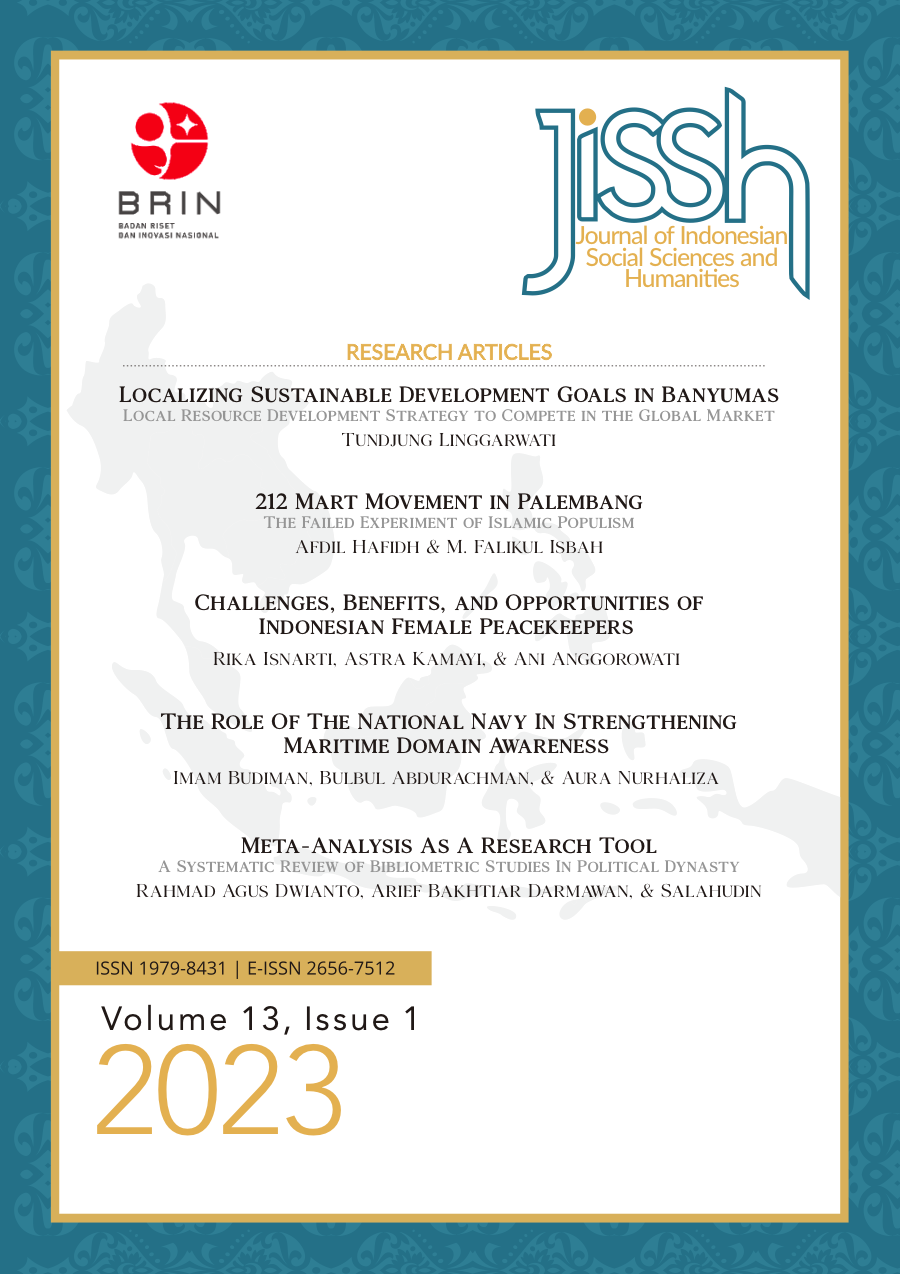Localizing Sustainabl Development Goals In Banyumas: Local Resource Development Strategy to Compete in The Global Market
Keywords:
Banyumas Regency, Local Resources, Localizing SDG, SDGs 9Abstract
The aim of this research is to analyze Banyumas Regency government’s efforts to develop local resources to compete in the global market. This effort is part of the 9th SDGs localization strategy related to industry, innovation, and infrastructure. One of the SDGs 9 targets related to local industry is target 9b, namely supporting the development of domestic technology, research, and innovation in developing countries. The author uses qualitative methods by collecting primary and secondary data. The author interviewed several business actors and representatives from the Banyumas Regency Industry and Trade Service (Dinperindag), scientific literature documents, and mass media. The research results show that local governments have attempted to develop small and medium enterprises as a local economic development strategy by considering local markets, needs, and resources. Regional governments participate in helping local entrepreneurs utilize local resources and exports to compete in the global market.
References
Badan Pusat Statistik. (2022). Indikator Tujuan Pembangunan Berkelanjutan Indonesia 2022. Jakarta: BPS RI.
BPS Kabupaten Banyumas. (2020). “Kabupaten Banyumas Dalam Angka.” Retrieved from https://banyumaskab.bps.go.id/publication/2020/04/27/fed8786afe3cb347eca4c132/kabupaten-banyumas-dalam-angka-2020.html.
BPS Kabupaten Banyumas. (2021). “Kabupaten Banyumas Dalam Angka.” Retrieved from https://banyumaskab.
bps.go.id/publication/2021/02/26/d32b7758e577bd4de55f7355/kabupatenbanyumas-dalam-angka-2021.html.
BPS Kabupaten Banyumas. (2022). “Kabupaten Banyumas Dalam Angka.” Retrieved from https://banyumaskab.bps.go.id/
BSN. (2016). Peraturan Kepala Badan Standardisasi Nasional Nomor 4 Tahun 2016 Tentang Pedoman Penulisan Standar Nasional Indonesia.
Cekindo. (2022). Panduan Serifikasi Sistem Verifikasi Legalitas Kayu (SLVK), diakses dari https://www.cekindo.com/id/blog/eksportir-kayu-sertifikat-legalitas
Control Union. (2022). “Certification Program.” Retrieved from https://controlunion.co.id/front_view/list_cert.
Dinperindag Kabupaten Banyumas. (2018). “Bagaimana Memulai Ekspor?” Retrieved from http://dinperindag.banyumaskab.go.id/read/27147/bagaimana-memulai-ekspor.
Dinperindag Kabupaten Banyumas (2022). “Ekspor-Impor Kabupaten Banyumas.” Retrieved from http://dinperindag.banyumaskab.go.id.
Karseno, K., Setyawati, R. (2013). The properties of nutmeg jam: proportion of cane sugar, coconut sugar and pineapple. Jurnal Pembangunan Pedesaan, 13(2), 147–155.
Kemendag RI. (2017a). Peraturan Menteri Perdagangan Republik Indonesia Nomor 38/M-Dag/Per/6/2017 Tentang Perubahan Kedua Atas Peraturan Menteri Perdagangan Nomor 84/M-Dag/Per/ 12/2016 Tentang Ketentuan Ekspor Produk Industri Kehutanan.
Kemendag RI. (2017b). Warta Ekspor; Peluang Ekspor Gula Semut. Retrieved from https://issuu.com/wartaekspor/docs/062017.
LOCALISE SDGs Indonesia. (2023a). “Sustainable Development Goals.” Retrieved from https://localisesdgs-indonesia.org/17-sdgs#a9.LOCALISE SDGs Indonesia. (2023b).
“LOCALISE SDGs in Indonesia: Leadership, Ownership, and Capacities for Agenda 2030 Local Implementation and Stakeholders Empowerment.” Retrieved from https://localisesdgsindonesia.org/tentang-kami.
Monoarfa, Suharso. (2023). “Rapor Pembangunan Berkelanjutan Indonesia.” Kompas. Retrived from https://www.kompas.id/baca/opini/2023/09/28/rapor-sdgs-indonesia.
Nastuti, Arin. (2019). “Stasiun Karantina Pertanian Lepas Ekspor Kayu Olahan ke Cina.” Retrieved from https://bercahayafm.cilacapkab.go.id/stasiun-karantina-pertanian-lepas-ekspor-kayu-olahan-ke-cina/.
Naufalin, R., Tri, Y., Anna, S. (2013). Types and concentration effect of natural preservatives on the quality of palm sugar. Jurnal Teknologi Pertanian, 14(3), 165–174.
Primasadi, Primasadi. (2018). “Gula Kelapa Banyumas Riwayatmu Kini dan Nanti.” LPPSLH. Retrieved from http://www.lppslh.or.id/artikel/gula-kelapabanyumas-riwayatmu-kini-dan-nanti/.
Puspadini, Mentari. (2023). “Ini Pentingnya Perlindungan Hukum UMKM Buat Bisnis.” CNBC Indonesia. Retrieved from https://www.cnbcindonesia.com/entrepreneur/20231012174348-25-480098/ini-pentingnya-perlindungan-hukum-umkm-buat-bisnis.
SDGs Indonesia, Kementrian PPN/Bappenas. (2023). “SDGs Knowledge Hub.” Retrieved from https://sdgs.bappenas.go.id.
Indriastuti, Erny. (2022). Personnal interview.
Nartam. (2022). Personnal interview.
Subarkah, Sri. (2020). Personnal interview.
Downloads
Published
Issue
Section
License

This work is licensed under a Creative Commons Attribution-ShareAlike 4.0 International License.
Authors who publish with this journal agree to the following terms:
1. Authors retain copyright and grant the journal right of first publication with the work simultaneously licensed under an Attribution-ShareAlike 4.0 International (CC BY-SA 4.0) license. This license allows others to remix, adapt, and build upon the work, as long as they credit the author and license their new creations under the same terms.
2. Authors may enter into separate, additional contractual arrangements for the non-exclusive distribution of the journal’s published version of the work (e.g., posting it to an institutional repository or including it in a book), provided there is an acknowledgment of its initial publication in this journal.
3. Authors are permitted and encouraged to post their work online (e.g., in institutional repositories or on their personal website) prior to and during the submission process, as this can lead to productive exchanges and increase citations of the published work (See The Effect of Open Access ).


















